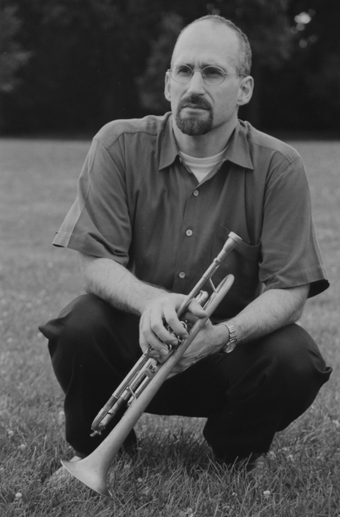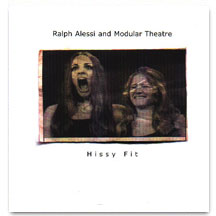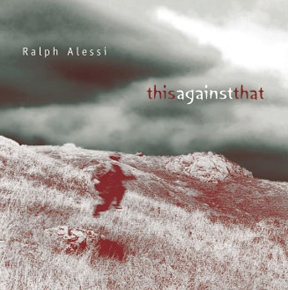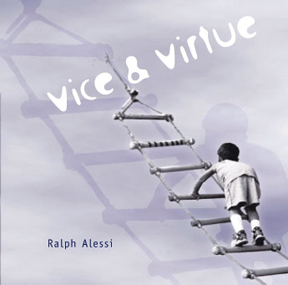
A FIRESIDE
CHAT WITH RALPH ALESSI
Steve Coleman is a dedicated cat. And it was through Coleman's music,
I was able to get hip to Ralph Alessi. Trumpet players, at least the ones
I listen to, play in their own vein, Dave Douglas' invention, Wadada Leo
Smith's invocation, Paul Smoker's abstraction, Herb Robertson's implosion,
Raphe Malik's experimentation (Axel Dorner, Roy Campbell, Bobby Bradford,
and sometimes Joe McPhee as well, but I couldn't think of anything else
that ended in "ion.") added to legends Miles, Don Cherry, Lester
Bowie, Booker Little, Freddie Hubbard, Lee Morgan, Bill Dixon, Kenny Dorham,
Diz, Alan Shorter, Clifford Brown, Fats, and Ornette. Alessi could very
well be on that list in a handful of years, but that is up to better men
than I, most of all Alessi himself. He's placed himself in good company,
Sam Rivers, the before mentioned Coleman, and contemporaries Jason Moran,
Scott Colley, and Ravi Coltrane. I spoke with Alessi during a recent tour
through Los Angeles about his music, his new releases (This Against That
and Vice and Virtue), and stretching the envelope, as always, unedited
and in his own words.
FRED JUNG:
Let's start from the beginning.
RALPH
ALESSI: I started playing trumpet at six. I studied with my father and
had, what I would say was a passive interest at first, in terms of studying
music. I was into music. I loved listening to music, in particular, I
loved listening to top forty radio, which was a different thing back then
as you know, Fred. I got excited about music that way, but in terms of
playing the trumpet, I had an interest in it. My dad was a trumpet teacher
and I suppose I was into it because of that. I didn't get serious studying
the trumpet until I was probably in high school and started to practice
more. That's how I got started. In terms of jazz, I started to take lessons
with a couple of students of my father's that were into jazz and got me
started in that direction. I took some lessons with them and they turned
me onto people like Clifford Brown and Miles Davis. That was kind of like
the beginnings and once I got into college, then it went to another level.
I studied mostly classical trumpet playing. That was kind of my main focus,
but was also interested in jazz and other things. Until I got to Cal Arts
in 1985, jazz kind of took a back seat and then I got to Cal Arts and
it totally changed my direction. I was around teachers like Charlie Haden
and James Newton and in particular, got excited playing with the students
there and meeting the students and playing with them and hanging with
them and getting excited about music on another level.
FJ: Ravi (Coltrane) was a classmate of yours.
RALPH
ALESSI: Yeah, Ravi, Scott Colley, Michael Caine, Peter Epstein and others.
But I think I was most struck by these people writing really interesting
music and a certain approach to music that I was not familiar with and
got sort of sucked into that. By the time I was ready to leave Cal Arts,
I knew that was what I wanted to do.
FJ: Influences?
RALPH
ALESSI: It is going to be a long list. The first person that popped into
my mind was Steve Coleman because he is such a strong, strong voice, strong
presence. I think all the people I know that have played with him would
say the same thing. It's virtually impossible not to be impacted by what
he does as a musician. In terms of the instrument, and this will be in
no particular order, Clifford Brown, I would say was the first influence
in terms of a jazz artist, Freddie Hubbard, there was a period where I
was very much into his playing, of course, Miles Davis. I would say at
first I was influenced by trumpet playing. I was kind of focused on that
and that morphed into being more influenced by music, the way people wrote
music or presented music. I was more interested in that the last ten years.
That's been my main focus. Trumpet wise, those people in addition to Lee
Morgan, Kenny Wheeler, for sure, and maybe in the last ten years, trumpet
players that I wasn't exposed to previously like Don Cherry, Paul Smoker,
who I met in Rochester, when I was there. He lives in that area and I
heard him play several times. Leo Smith. Ornette Coleman.
FJ: Steve has a rep of living and breathing the music.
RALPH
ALESSI: He definitely does. That's good information that you have. Have
you spoken to Steve before?
FJ: I have.
RALPH
ALESSI: I played with Steve for a period of six, seven years. I think
most, if not all the musicians that played with Steve, view the experience
of playing with Steve as being in school in a lot of ways, in terms of
what he is able to do as a musician and the concept that he is working
with. They are very, very advanced, but so beneficial. The tours and recordings
and all of that, I view that as just being a student and trying to learn
and take advantage of that situation. Maybe it was akin to the musicians
that played with Bird, where Bird was just so far ahead of everyone. Maybe
it was that kind of experience. I learned so much of being more responsible
for your studying the music and knowing the music, rather than being passive
about it and knowing your part. Steve really encourages you to learn all
the aspects, all the components of the music. I thought that was a great
lesson and I've tried to pass that on to my students too. Also, the way
he leads a band. That was very interesting. His sensibilities about business
and knowing how that works. His veracity for studying everything, just
being a lifelong student. That is what he is and that is why he has so
much to offer.
FJ: The once prominent classical interest is suggested in your music.
RALPH ALESSI:
Yeah, for sure, then again, I think a lot of other things come out too.
Certainly, yeah, music that I've listened to, music that I've studied,
in a way, maybe trumpet literature, certain etudes that I studied, I know
that's part of me too. It is hard to say. It is hard to pinpoint those
things. I think throughout your life, I think all of that comes out, sometimes
in conscious ways, but often times, in subconscious ways.
FJ: If jazz isn't bebop or post-bop or a variation of, stretching the
envelope has a tendency to get misunderstood. Steve Coleman and Sam Rivers
(Alessi has worked with both) are case and point and there are parallels
with your own music. It seems like a lose-lose situation.
RALPH
ALESSI: Well, I guess, it is better to be recognized on some level, I
suppose. There is always going to be a lose aspect to that because I just
read a review of my gig by Don Heckman (LA Times) the other day and that
is someone that maybe didn't quite understand what I'm trying to do or
whatnot. I think it is more complex now. I think it used to be more black
and white back in the day. Right now, there are, we are all dealing with
so many influences, not only in the jazz realm, but being influenced by
music all over the world, so there is this kind of outcome that is more
amorphous in a lot of ways and maybe it frustrates people in not knowing
or maybe they think they know and they don't know. I suppose it takes
longer for it to come into focus, in terms of how you are perceived and
understanding what you're trying to do. I suppose if anyone takes note
of me, they might be confused by what I've done and trying to make some
sense out of it because maybe it is diverse and the fact that I've played
with Ravi, which has been a little bit more jazz oriented and straight
ahead and then I made this record with Michael Caine on ECM and it is
something else and then the stuff with Steve and my own music. My first
record called Hissy Fit (Love Slave), which was very, very, very raw,
kind of in the moment documentation of these musicians just kind of playing
together and exploring some music, as opposed to This Against That (RKM),
which is more tune oriented. So yeah, I think maybe it just takes time.
I think the writers are starting to understand more about Steve. There
is quite a difference between articles about Steve ten years ago and now.
As you are articulating right now, it seems like you have an understanding
as to what he is trying to do, but I am sure there was a time where everybody
was saying that M-Base was a style. There is probably less of that now.
FJ: Let's touch on the two RKM releases, This Against That and Vice and
Virtue.
RALPH
ALESSI: I should say that both of those records were not really thought
of as records. They were recording opportunities. They were opportunities
to document. I guess Hissy Fit was that way too, so maybe I have a trend
going on here. After the music was documented, then I sort of sifted through
it and thought I could put this out and that is where Ravi stepped in
and found an interest in that. In terms of those particular situations,
Vice and Virtue, the original intention was to record a quartet and I
wanted to do it with Shane Endsley, Scott Colley, and Jason Moran, and
Jason and Scott were busy and they dropped out of it at the last second
and I had the time to record, the studio time, so I have such respect
and such confidence in making the music with Shane that I thought that
we could get to something. That was very informal and very loose in the
right way, where we talked about what we wanted to do right there. Shane
brought in a couple of things. I brought in a couple of things, but other
than that it was "what do you want to play now?" "What
do you want to try?" It evolved that way. So that was more about
the trust in another musician where you are really so confident that you
can get to some music that you feel is good. This Against That was documentation
of music made by those musicians after we had kind of worked with that
music a little bit, a couple of gigs over the course of six months. I
just wanted to see where we were at with that music and see if we could
play it and for it to be something that I thought was high quality. It
ended up being that. That music is more about tunes and forms and less
improvised. It is a little more orchestrated. I enjoy doing things like
that, in addition to other things that are more open.
FJ: Record labels have a genuine disinterest in documentation "of
the moment," opting for all-star bands and concept dates akin to
their pop counterparts.
RALPH
ALESSI: For me, there is an essence in the music that is always there.
I've been in so many situations where people kind of beat it into the
ground in terms of over rehearsing and taking too many takes and just
basically ruining that set magic that's there. For me, the ultimate role
model is Kind of Blue, the way that was recorded and that's the way I
like to record. You're right, Fred, if you're with an actual label, they're
not going to be so down for that, whereas in this situation and there
are many now, with the advent of independent labels, there are a lot of
situations where you really can record the way you want to record. So
it is a good news, bad news kind of situation because it is hard to get
your records out there because there are so many, so many people trying
to do this, but the flipside is that there are probably a lot of great
music being made in that way, which you have to find. That is definitely
the way I like to record. Those sessions, well, the one session with Jason
Moran and Nasheet and Drew, that was literally them showing up, me pulling
out some music, rehearsing it for maybe five minutes, ten minutes tops,
and OK let's role tape and that was the first take. There is that kind
of element of being on the edge, but being cool with that and you really
get to some great music that way, so that's the way I like to perform.
FJ: And the future?
RALPH
ALESSI: We're moving on to the Bay Area tomorrow. I'm playing a gig there
and then we're going to University of Reno, doing a master class and a
performance. Then we're going up to the Earshot Festival in Seattle and
we're doing four gigs there and Don Byron is going to fly out for those
gigs. Then it is home and another gig with Don. In terms of my projects,
I already have another recording that's finished. That would be another
Modular Theatre record. I don't know if you've heard Hissy Fit, but it
is kind of continuing that concept, having spoken word be an integral
part of it. That is basically done. I just need to mix that and see if
anyone wants to put that out. I want to record another record with the
band that is on This Against That or something close to that, maybe with
Jason Moran and I've been talking to Fred Hersch about doing a duo record
for a while so hopefully we can get to that soon. They have something
that is pretty amazing. I'm really very particular with pianists. I actually
don't really, I'm not that fond of playing with pianists most of the time.
I've really been enjoying playing with Andy Milne this week. He has a
side to him that I don't think a lot of people have really heard. I kind
of heard glimpses of that in the situations playing with Ravi and I think
this situation has been so open, he's been able to get to that and he's
been playing so great.
Fred Jung is the Editor-In-Chief and doesn't travel anywhere without it.
Comments? Email Him



